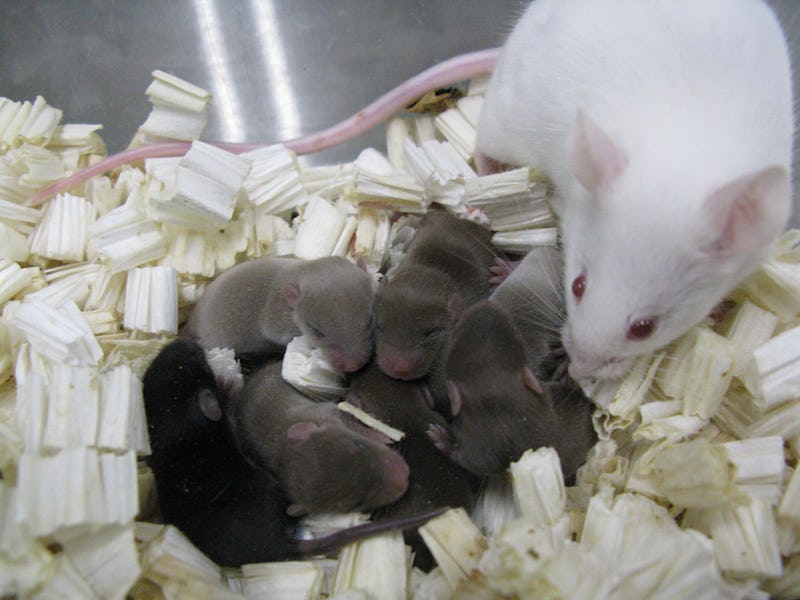Freeze-Dried Mouse Sperm Means Space Babies Are Possible
More realistically, though, might be space steaks.

In the greatest debate that never seemed possible, would you rather have space babies or space steak?
In a study published Monday in Proceedings of the National Academy of Sciences, a team of Japanese researchers reports that they’ve produced healthy pups from freeze-dried mouse spermatozoa that spent 288 days on the International Space Station.
And while that sounds like space babies are right on the horizon, the researchers are confident that the more immediate conclusion we can prove from pups in space is that livestock is possible — in other words, space beef.
One of the biggest obstacles limiting long-distance space travel is space radiation. Spaceflight exposes travelers to much higher levels of this DNA-damaging particle radiation. That means that while sex in space is difficult, should conception occur, it’s the least of our problems with radiation: In addition to causing cancer, space radiation can possibly mutate sperm and egg cells, making it difficult to produce healthy offspring. And since space voyages to even our nearest exoplanets could take generations, space babymaking is a prime concern.
These are no ordinary juvenile mice. These "space pups" were produced by freeze-dried sperm that spent nine months aboard the ISS.
Just reproducing wouldn’t be enough, though, since the small population aboard a spacecraft would quickly experience inbreeding and all the problems that come with it. To prevent this, it would be necessary to send preserved sex cells on a space voyage to ensure genetic diversity among colonists.
That’s where freeze-dried mouse spermatozoa come in. Teruhiko Wakayama, a space pup scientist at the University of Yamanashi in Japan, and his colleagues wanted to see whether preserved sex cells could survive a trip to space and still work properly. To test this, they preserved sperm cells from lab mice by freeze-drying them. They sent these samples up in the ISS for nine months, where they were exposed to around 100 times the radiation they would have experienced during that time on Earth.
The scientists sent glass ampules full of freeze-dried mouse sperm (A) wrapped in bundles (B) along with a radiation detector (C) to spend nine months aboard the ISS.
When the scientists got the samples back, they examined the cells for the DNA damage you could expect to see after that level of radiation exposure. The researchers found that the space sperm had slightly elevated levels of DNA damage compared to the control group that remained on Earth, but when they impregnated female mice with these cells, the fertility rate was roughly equal to that of the Earth-bound control group, and the offspring were healthy. Those pups even produced another generation of healthy offspring, suggesting that the levels of DNA damage experienced during the nine-month trip to the ISS were small enough to be overcome during embryo development. This was an encouraging result for the researchers involved in the project.
“We are very happy that space pups were all normal,” Wakayama tells Inverse.
Something that stands out about this study is the researchers’ choice to freeze-dry the sperm cells instead of cryopreserving them, the typical method for preserving sperm. This unusual move allows the cells to be stored at room temperature for up to two years, and in a freezer almost indefinitely. This would be a huge benefit on future space missions, where energy and space are at a premium.
Wakayama explains that this research was motivated by a desire to look forward into the future, to a time when humans might live in space. And though we’ve seen humans living in space in the context of many science fiction movies, he tells Inverse, “In our knowledge, there is no research whether humans can reproduce in space.”
And while it’s easy to read this study and dream of space babies, Wakayama explains that it’s more likely this research will be used to breed livestock than humans. When asked whether we can do this procedure for humans, he responded pretty firmly in the negative.
“Our main subject is domestic animal reproduction,” he says. “Our interest is, can we eat steak in space?”
So there you have it: We’ll probably have steak in space before we have babies in space.
Abstract: If humans ever start to live permanently in space, assisted reproductive technology using preserved spermatozoa will be impor- tant for producing offspring; however, radiation on the International Space Station (ISS) is more than 100 times stronger than that on Earth, and irradiation causes DNA damage in cells and gametes. Here we examined the effect of space radiation on freeze-dried mouse spermatozoa held on the ISS for 9 mo at –95 °C, with launch and recovery at room temperature. DNA damage to the sperma- tozoa and male pronuclei was slightly increased, but the fertiliza- tion and birth rates were similar to those of controls. Next- generation sequencing showed only minor genomic differences between offspring derived from space-preserved spermatozoa and controls, and all offspring grew to adulthood and had normal fertility. Thus, we demonstrate that although space radiation can damage sperm DNA, it does not affect the production of viable offspring after at least 9 mo of storage on the ISS.